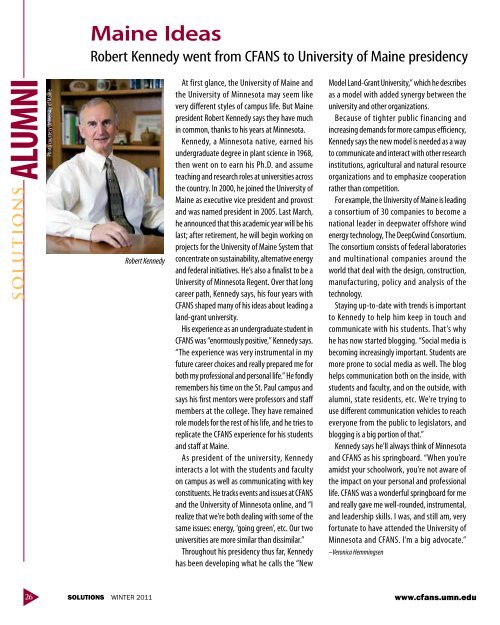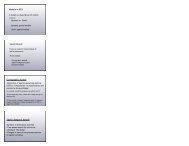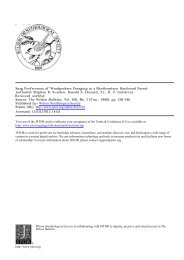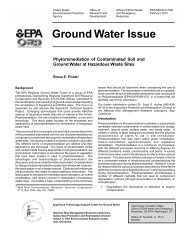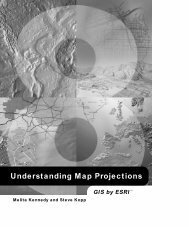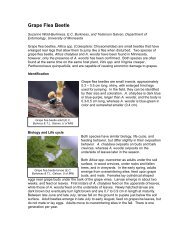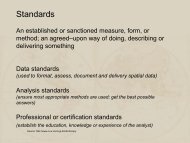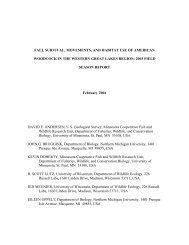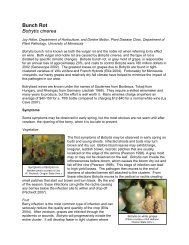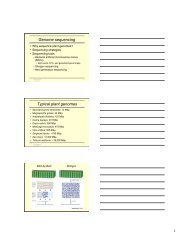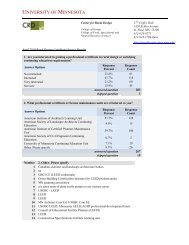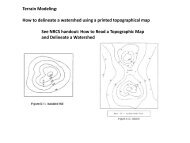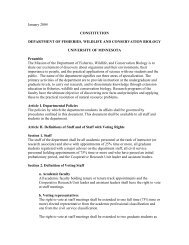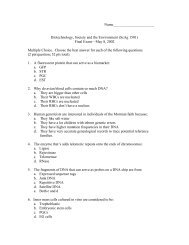PDF Version - College of Food, Agricultural and Natural Resource ...
PDF Version - College of Food, Agricultural and Natural Resource ...
PDF Version - College of Food, Agricultural and Natural Resource ...
You also want an ePaper? Increase the reach of your titles
YUMPU automatically turns print PDFs into web optimized ePapers that Google loves.
solutions AlUMNi<br />
Photo courtesy University <strong>of</strong> Maine<br />
Maine Ideas<br />
Robert Kennedy went from CFANS to University <strong>of</strong> Maine presidency<br />
Robert Kennedy<br />
At first glance, the University <strong>of</strong> Maine <strong>and</strong><br />
the University <strong>of</strong> Minnesota may seem like<br />
very different styles <strong>of</strong> campus life. But Maine<br />
president Robert Kennedy says they have much<br />
in common, thanks to his years at Minnesota.<br />
Kennedy, a Minnesota native, earned his<br />
undergraduate degree in plant science in 1968,<br />
then went on to earn his Ph.D. <strong>and</strong> assume<br />
teaching <strong>and</strong> research roles at universities across<br />
the country. In 2000, he joined the University <strong>of</strong><br />
Maine as executive vice president <strong>and</strong> provost<br />
<strong>and</strong> was named president in 2005. Last March,<br />
he announced that this academic year will be his<br />
last; after retirement, he will begin working on<br />
projects for the University <strong>of</strong> Maine System that<br />
concentrate on sustainability, alternative energy<br />
<strong>and</strong> federal initiatives. He’s also a finalist to be a<br />
University <strong>of</strong> Minnesota Regent. Over that long<br />
career path, Kennedy says, his four years with<br />
CFANS shaped many <strong>of</strong> his ideas about leading a<br />
l<strong>and</strong>-grant university.<br />
His experience as an undergraduate student in<br />
CFANS was “enormously positive,” Kennedy says.<br />
“The experience was very instrumental in my<br />
future career choices <strong>and</strong> really prepared me for<br />
both my pr<strong>of</strong>essional <strong>and</strong> personal life.” He fondly<br />
remembers his time on the St. Paul campus <strong>and</strong><br />
says his first mentors were pr<strong>of</strong>essors <strong>and</strong> staff<br />
members at the college. They have remained<br />
role models for the rest <strong>of</strong> his life, <strong>and</strong> he tries to<br />
replicate the CFANS experience for his students<br />
<strong>and</strong> staff at Maine.<br />
As president <strong>of</strong> the university, Kennedy<br />
interacts a lot with the students <strong>and</strong> faculty<br />
on campus as well as communicating with key<br />
constituents. He tracks events <strong>and</strong> issues at CFANS<br />
<strong>and</strong> the University <strong>of</strong> Minnesota online, <strong>and</strong> “I<br />
realize that we’re both dealing with some <strong>of</strong> the<br />
same issues: energy, ‘going green’, etc. Our two<br />
universities are more similar than dissimilar.”<br />
Throughout his presidency thus far, Kennedy<br />
has been developing what he calls the “New<br />
Model L<strong>and</strong>-Grant University,” which he describes<br />
as a model with added synergy between the<br />
university <strong>and</strong> other organizations.<br />
Because <strong>of</strong> tighter public financing <strong>and</strong><br />
increasing dem<strong>and</strong>s for more campus efficiency,<br />
Kennedy says the new model is needed as a way<br />
to communicate <strong>and</strong> interact with other research<br />
institutions, agricultural <strong>and</strong> natural resource<br />
organizations <strong>and</strong> to emphasize cooperation<br />
rather than competition.<br />
For example, the University <strong>of</strong> Maine is leading<br />
a consortium <strong>of</strong> 30 companies to become a<br />
national leader in deepwater <strong>of</strong>fshore wind<br />
energy technology, The DeepCwind Consortium.<br />
The consortium consists <strong>of</strong> federal laboratories<br />
<strong>and</strong> multinational companies around the<br />
world that deal with the design, construction,<br />
manufacturing, policy <strong>and</strong> analysis <strong>of</strong> the<br />
technology.<br />
Staying up-to-date with trends is important<br />
to Kennedy to help him keep in touch <strong>and</strong><br />
communicate with his students. That’s why<br />
he has now started blogging. “Social media is<br />
becoming increasingly important. Students are<br />
more prone to social media as well. The blog<br />
helps communication both on the inside, with<br />
students <strong>and</strong> faculty, <strong>and</strong> on the outside, with<br />
alumni, state residents, etc. We’re trying to<br />
use different communication vehicles to reach<br />
everyone from the public to legislators, <strong>and</strong><br />
blogging is a big portion <strong>of</strong> that.”<br />
Kennedy says he’ll always think <strong>of</strong> Minnesota<br />
<strong>and</strong> CFANS as his springboard. “When you’re<br />
amidst your schoolwork, you’re not aware <strong>of</strong><br />
the impact on your personal <strong>and</strong> pr<strong>of</strong>essional<br />
life. CFANS was a wonderful springboard for me<br />
<strong>and</strong> really gave me well-rounded, instrumental,<br />
<strong>and</strong> leadership skills. I was, <strong>and</strong> still am, very<br />
fortunate to have attended the University <strong>of</strong><br />
Minnesota <strong>and</strong> CFANS. I’m a big advocate.”<br />
–Veronica Hemmingsen<br />
26 SOLUTIONS WINTER 2011 www.cfans.umn.edu


